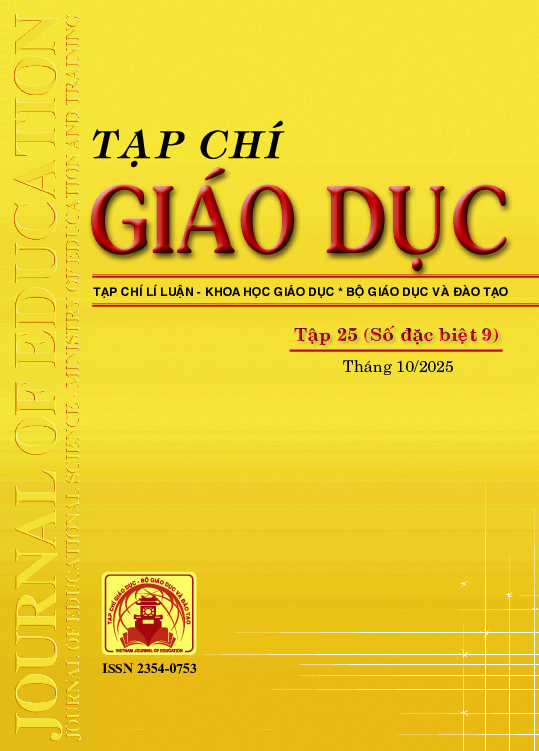Nhận thức về chuẩn đầu ra của sinh viên ngành Y học cổ truyền tại Trường Đại học Y Dược Cần Thơ
Tóm tắt
Comprehensive professional competence is a core requirement in medical education, in which program learning outcomes (PLOs) play a pivotal guiding role. This study surveyed 263 fourth-, fifth-, and sixth-year Traditional Medicine students at Can Tho University of Medicine and Pharmacy to analyze their awareness of PLOs across three domains: knowledge, skills, and autonomy - responsibility. Results indicated that overall awareness was very high (Mean=4.30), with the highest in knowledge (4.34), followed by autonomy - responsibility (4.29), and the lowest in skills (4.25), particularly first-aid and emergency coordination. Awareness increased steadily from year 4 (4.10) to year 6 (4.40). The study identified two main gaps: insufficient integration of basic science with clinical practice and delayed development of practical skills. These findings provide empirical evidence for curriculum improvement, emphasizing early and continuous integration and balanced development across the three competency domains.
Tài liệu tham khảo
Alharbi, N. S. (2024). Evaluating competency-based medical education: a systematized review of current practices. BMC Medical Education, 24(1), 612. https://doi.org/10.1186/s12909-024-05609-6
Ban Chấp hành Trung ương (2013). Nghị quyết số 29-NQ/TW ngày 04/11/2013 về đổi mới căn bản, toàn diện giáo dục và đào tạo, đáp ứng yêu cầu công nghiệp hóa, hiện đại hóa trong điều kiện kinh tế thị trường định hướng xã hội chủ nghĩa và hội nhập quốc tế.
Biggs, J., & Tang, C. (2007). Teaching for quality learning at university (3rd ed.). Maidenhead: McGraw-Hill Education & Open University Press.
Bộ Y tế (2022). Quyết định số 3159/QĐ-BYT ngày 23/11/2022 về việc phê duyệt tài liệu “Chuẩn năng lực cơ bản của Bác sĩ Y học cổ truyền Việt Nam”.
Frank, J. R., Snell, L., & Sherbino, J. (Eds.) (2015). CanMEDS 2015 Physician Competency Framework. Ottawa: Royal College of Physicians and Surgeons of Canada.
Gosling, D., & Moon, J. (2002). How to use learning outcomes and assessment criteria. London: SEEC Office, University of East London.
Gruppen, L. D., Mangrulkar, R. S., & Kolars, J. C. (2012). The promise of competency-based education in the health professions for improving global health. Human Resources for Health, 10(43). https://doi.org/10.1186/1478-4491-10-43
Harden, R. M. (2007). Outcome-based education: The future is today. Medical Teacher, 29(7), 625-629. https://doi.org/10.1080/01421590701729930
Hou, J., Michaud, C., Li, Z., Dong, Z., Sun, B., Zhang, J., Cao, D., Wan, X., Zeng, C., Wei, B., Tao, L., Li, X., Wang, W., Lu, Y., Xia, X., Guo, G., Zhang, Z., Cao, Y., Guan, Y., ... Chen, L. (2014). Transformation of the education of health professionals in China: Progress and challenges. The Lancet, 384(9945), 819-827. https://doi.org/10.1016/S0140-6736(14)61307-6
Thủ tướng Chính phủ (2016). Quyết định số 1982/QĐ-TTg ngày 18/10/2016 về việc phê duyệt Khung trình độ quốc gia Việt Nam.
Trường Đại học Y Dược Cần Thơ (2023). Quyết định số 2891/QĐ-ĐHYDCT ngày 25/8/2023 về việc ban hành Chuẩn đầu ra chương trình đào tạo ngành Y học cổ truyền.
Zhang, Z., Zhang, Z., Yu, Y., Jiang, M., Deng, L., & Guo, L. (2024). Impact of different teaching modes on medical students’ performance under the scoring criteria for multiple-choice questions: A meta-analysis. Medicine, 103(51), e41008. http://doi.org/10.1097/MD.0000000000041008
Đã Xuất bản
Cách trích dẫn
Số
Chuyên mục
Giấy phép

Tác phẩm này được cấp phép theo Ghi nhận tác giả của Creative Commons Giấy phép quốc tế 4.0 .












